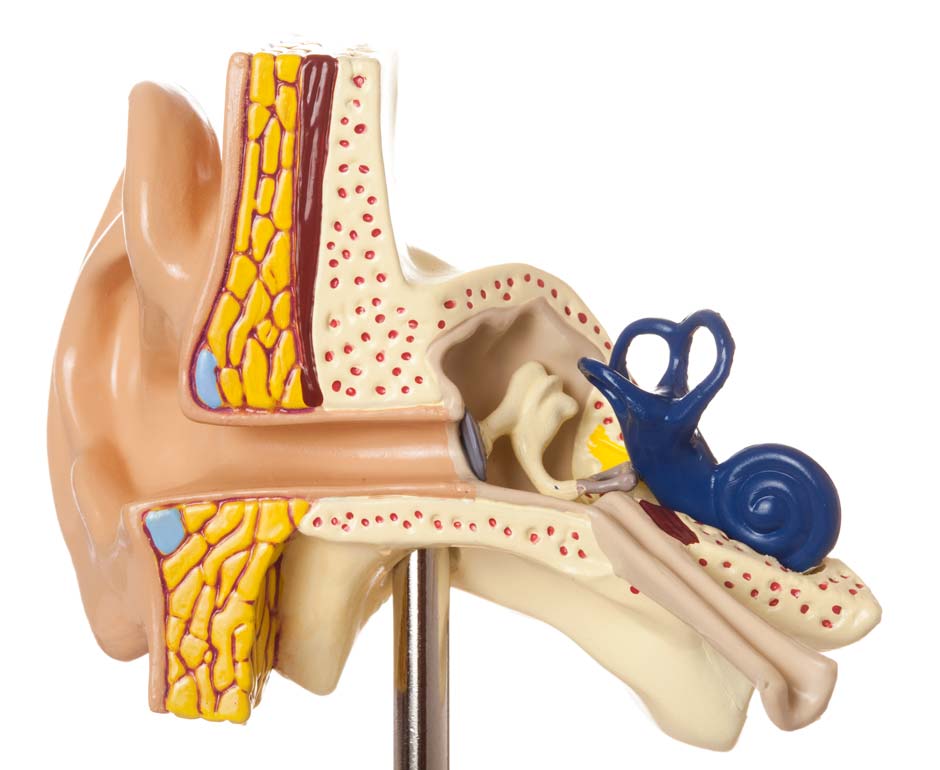While your inner ear helps you make sense of the sound vibrations that lead to hearing, it’s also home to the vestibular system. This important sensory system controls balance, motion and the spatial awareness you have with your head and body.
When your inner ear isn’t working properly, it can cause debilitating symptoms of dizziness, vertigo (feeling as if the room is spinning) and nausea. Two common conditions that affect your vestibular system are labyrinthitis and vestibular neuritis, both of which are types of inner ear infections.
These infections can negatively affect your quality of life, so it’s important to resolve them quickly and make sure there aren’t other, more serious reasons for your symptoms. The nationally ranked ear, nose and throat (ENT) doctors at The Ohio State University Wexner Medical Center in Columbus, Ohio, specialize in treating balance conditions like labyrinthitis and vestibular neuritis.
 What is labyrinthitis?
What is labyrinthitis?
Labyrinthitis is an inner ear infection that causes inflammation and swelling of the labyrinth, which contains the cochlea (hearing) and the vestibular system (balance). That means this condition can cause symptoms that relate to balance as well as hearing loss.
The condition is usually caused by a virus, but sometimes bacteria can attack the labyrinth. Types of viruses and bacteria that can cause labyrinthitis include:
- Ear infections
- Respiratory illnesses like colds, the flu or bronchitis
- Herpes viruses, which cause cold sores, chicken pox or shingles
- Stomach viruses
- Mumps, measles, rubella and hepatitis
- Other bacterial infections
Labyrinthitis infections can also be triggered by environmental or behavioral issues, such as:
- Stress
- Heavy alcohol use
- Allergies
- Smoking
- Chronic fatigue
- Use of certain medications, such as anti-depressants, anti-inflammatories or diabetes medications
What is vestibular neuritis?
Vestibular neuritis (neuronitis) is an inner ear infection that causes inflammation and swelling of the vestibular nerve, which carries signals from the inner ear to the brain to help with balance. The infection is usually caused by a virus that originates from either the inner ear or somewhere else in the body, such as chicken pox or viral hepatitis.
The condition is one of the most common causes of vertigo, which might make you feel dizzy or as if the room is spinning.
Labyrinthitis vs. vestibular neuritis
Both conditions are inner ear infections that can lead to balance issues. They’re also typically caused by viruses and come on suddenly over only a few hours; however, there are some key differences between labyrinthitis and vestibular neuritis. Those include:
- Labyrinthitis impacts the labyrinth while vestibular neuritis affects the vestibular nerve.
- Hearing loss or other hearing issues occur only with labyrinthitis.
- Labyrinthitis can also be caused by bacteria.
Symptoms of labyrinthitis and vestibular neuritis
The symptoms are similar for both conditions. The main symptom of both is vertigo. Other symptoms that are common with both labyrinthitis and vestibular neuritis include:
- Loss of balance
- Dizziness
- Lightheadedness
- Motion sensitivity
- Blurred vision
- Nausea and vomiting
- Difficulty concentrating
Because labyrinthitis can also affect the cochlea in the inner ear, the condition can also cause hearing loss, tinnitus (ringing in the ears) or other hearing problems.
How are labyrinthitis and vestibular neuritis diagnosed?
An otolaryngologist (an ENT doctor) usually diagnoses these conditions; however, they might collaborate with an audiologist or a neurologist depending on your symptoms. The ENT doctor will first perform a physical examination of your ear and talk with you about your medical history.
With symptoms like sudden onset of vertigo or blurred vision, it’s important for your doctors to run imaging tests to rule out other, more serious causes (stroke, tumors) of your symptoms.
Other tests our ENT team might run include:
- Hearing tests
- Balance tests, such as electronystagmography and caloric stimulation
- Magnetic resonance imaging (MRI) scans or computed tomography (CT) scans
Labyrinthitis and vestibular neuritis treatment
Both infections typically go away on their own in a few weeks to months.
Still, dealing with even a few days of symptoms like vertigo and loss of balance can be debilitating, so there are various medications we can use to provide relief until the infection clears up. Depending on what virus might be causing the infection, treatments we can use include:
- Drugs to manage nausea and vomiting
- Antihistamines (although these should be used very short-term as they can delay healing)
- Medicines for dizziness
- Sedatives
- Corticosteroids
- Antivirals
Sometimes symptoms take longer than a few weeks to subside. These infections can even lead to chronic conditions. Your doctor might suggest vestibular rehabilitation so you can learn exercises you can do at home to cope with lingering symptoms.
Vestibular rehabilitation at Ohio State
The Ohio State Wexner Medical Center is specially equipped to help people dealing with vestibular disorders that impede daily living. Not only do we have several neurotologists and other experts on our staff, but we also have a specialized Vestibular Disorders Rehabilitation Program to help those with conditions like labyrinthitis or vestibular neuritis.
Our therapists, who are certified in Herdman vestibular treatment approaches, will use equipment like Frenzel goggles and liquid-crystal display (LCD) video to determine the best treatment plan. Then, their work with you will focus on eye movement control, balance retraining, and stretching and strengthening — all of which can help minimize the effects of vertigo and other symptoms of inner ear infections.
This rehabilitation program is just one of the many benefits of being treated for a vestibular problem at The Ohio State Wexner Medical Center.
Additional Information
How would you like to schedule?
Don’t have MyChart? Create an account
